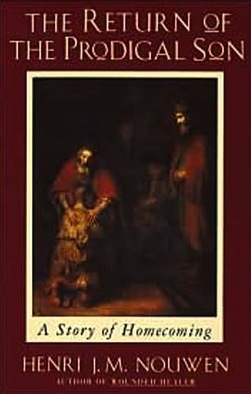Entries in Mentor (5)
Five Men Who Forever Changed My Life
 Thursday, February 9, 2012 at 12:02AM
Thursday, February 9, 2012 at 12:02AM  Writing is an exercise in faith. Either that, or vanity. Alone at a keyboard, the voice in my head is my own, and I imagine these pixels will light up some other screen God-knows-where. Writing requires an inflated sense of self-worth. The only act more vain is to write a post all about me. Today I want to share with you the writers who have shaped my life. These five books were not the result of "study." Each was life-changing encounter. Someday, at the marriage supper of the Lamb, I will ask for the privilege of pouring wine at the table of these men.
Writing is an exercise in faith. Either that, or vanity. Alone at a keyboard, the voice in my head is my own, and I imagine these pixels will light up some other screen God-knows-where. Writing requires an inflated sense of self-worth. The only act more vain is to write a post all about me. Today I want to share with you the writers who have shaped my life. These five books were not the result of "study." Each was life-changing encounter. Someday, at the marriage supper of the Lamb, I will ask for the privilege of pouring wine at the table of these men.

God in the Dock, C.S. Lewis—I had been a high-school evangelical for three years when someone handed me this collection of essays. They changed my life, and Lewis became my first teacher. If you have never read C.S. Lewis, you have missed one of God’s great gifts to the church in the last hundred years. God in the Dock is the most formative work in my life because it was the first to capture my heart and my mind. Thirty-plus years later, Lewis is my constant companion.
 The Divine Conspiracy, Dallas Willard—This book put into words the things I knew, but didn’t know that I knew. Willard is a Southern Baptist with a PhD in Philosophy who teaches at USC: that’s enough to stretch anyone’s idea of what it means to be a Christian. He cracks open our narrow ideas of “the gospel” and re-introduces Evangelicals to “the gospel of the Kingdom of God.” The Kingdom of God was the message of John the Baptist, Jesus, and the Apostle Paul. It should be the message of every student of Jesus but I daresay not one out of ten would define the gospel that way.
The Divine Conspiracy, Dallas Willard—This book put into words the things I knew, but didn’t know that I knew. Willard is a Southern Baptist with a PhD in Philosophy who teaches at USC: that’s enough to stretch anyone’s idea of what it means to be a Christian. He cracks open our narrow ideas of “the gospel” and re-introduces Evangelicals to “the gospel of the Kingdom of God.” The Kingdom of God was the message of John the Baptist, Jesus, and the Apostle Paul. It should be the message of every student of Jesus but I daresay not one out of ten would define the gospel that way.
The Return of the Prodigal Son, Henri Nouwen—This book taught me what it meant to reflect upon the scripture. Nouwen is an exegete of the soul. Return of the Prodigal was not the first of his books I read, but it moved me more than any other. It taught me by example how to meditate on the scriptures, and how to place myself into the Biblical narrative. When anyone asks me what it means to go deep in the scripture, I give them this book. Let me know if you want a copy.
The Practice of the Presence of God, Brother Lawrence—This little collection of letters and thoughts from a centuries-gone Carmelite brother is disarmingly--and dangerously--simple. Far from retreating from the world, Brother Lawrence opens the possibility of being with God every moment. His message is sacramental in the most universal sense. I discovered the secret of not just a daily life with Him, but life that is available moment-by-moment. The Creator of the universe is not far from any one of us: all we need to do is “turn.”
The Remains of the Day, Kazuo Ishiguro—The only work of fiction on this vain list. No amount of explaining will convey the impact this book had on me, but I would be dishonest if I left it off. Perhaps it would mean nothing to you, but it taught me that a life of selfless service is not enough. We are responsible for who and what we serve. This book gloriously wrecked my life. I wept for weeks after reading it, and everything I’ve done since 1994 is a result of it’s impact. You may read it and think, “that’s it?” But if I ever meet Mr. Ishiguro, I will bow before him!
Writing is an act of vanity, but it can also be a gift to generations unseen. I will be forever grateful for the gifts I have received. These writers have made me who I am. More than any others, they formed my life with God. I have had plenty more fellow-travelers. Francis Schaeffer, St. Augustine, Gerard Manley Hopkins, J.R.R. Tolkein, G.K. Chesterton, John Milton, Thomas a Kempis, A.W. Tozer, William Blake, and Ray Bradbury, but in a very real way, these five have changed my life.
May I include one final observation before we part? Years ago I taught a Spiritual Formation class at a nearby university. Our class read Willard’s Renovation of the Heart during the semester. One student, a junior in college, told me that he had never read an entire book, cover-to-cover, before in his life. How could this be? Perhaps it was just this one guy, but I cannot see how one can claim to be a follower of Jesus apart from drinking deep at the well of other believers, and that includes reading books. Not quantity. We should invite the Holy Spirit to be our tutor while we learn at the feet of past masters.
What are your life-changing books? Please let me know. I'll read your comments with great interest.
Guys Like Us
 Thursday, March 4, 2010 at 03:58PM
Thursday, March 4, 2010 at 03:58PM “The Bible itself teaches that we are to understand it in terms of our own experience when it says that Paul, Barnabas, and Elijah were human beings like us . . . It means that their experience was substantial like our own . . . We must pray for the faith and the experiences that would enable us to believe that such things could happen to us.” ~ Dallas Willard, Hearing God
In Damascus there was a disciple named Ananias. The Lord called to him in a vision, "Ananias!"
"Yes, Lord," he answered.
The Lord told him, "Go to the house of Judas on Straight Street and ask for a man from Tarsus named Saul, for he is praying. In a vision he has seen a man named Ananias come and place his hands on him to restore his sight."
"Lord," Ananias answered, "I have heard many reports about this man and all the harm he has done to your saints in Jerusalem. And he has come here with authority from the chief priests to arrest all who call on your name."
But the Lord said to Ananias, "Go! This man is my chosen instrument to carry my name before the Gentiles and their kings and before the people of Israel. I will show him how much he must suffer for my name."
Then Ananias went to the house and entered it. Placing his hands on Saul, he said, "Brother Saul, the Lord--Jesus, who appeared to you on the road as you were coming here--has sent me so that you may see again and be filled with the Holy Spirit." Immediately, something like scales fell from Saul's eyes, and he could see again. He got up and was baptized, and after taking some food, he regained his strength.
- God spoke to him in a vision (v10): Yes, visions should be normative. The coming of the Holy Spirit at Pentecost redefined the role between Creator and disciple. At Pentecost Peter boldly tells us what kind of age has come: “Your sons and daughters will prophesy, your young men will see visions, your old men will dream dreams.” (Acts 2: 17) Peter isn’t just quoting an ancient prophet, he’s describing how God speaks to his people in Christ. God still speaks in these ways, but the average North American Christian is actually suspicious of these divine avenues.
- God gave specific instructions (vs11-12): Ananias knew where to go and what to do, because he heard from God. How many believers today know God’s specific will for their lives day-by-day? My experience as a pastor has taught me, sadly, that most Christians are confused about God’s will for their life and important decisions. Day-to-day most Christians do not even expect to receive specific instructions from the Lord. Ananias was apparently part of a church that trained and encouraged every member to expect to hear from God--and act on it!
- Ananias dialogued with God (vs13-15): It was a dialogue from the heart. He was not a robot, he shared his fears and concerns. I don’t believe Ananias argued with God. He addressed him as “Lord” because he recognized who was Master. His submission was so complete he even surrendered his fears to God. True service to God does not simply come from those who have heard from God, but from those who also feel they have been heard by God.
- God affirmed the mission (vs15-16): The Lord did not merely shake the windows or stamp his foot, he gave Ananias a picture of the future. This man Saul was God’s chosen instrument, and Ananias knew it even before Saul knew it. Part of our confidence to do the will of God comes from knowing his purposes and plans, and God is gracious to supply such vision more than we are aware.
- Ananias obeyed (vs17-19): Dreams, visions and revelations are worthless apart from obedience. God does not share information “FYI,” he shares information “FYA--For Your Action.” Ananias’ actions were filled with faith and the assurance of God’s commission. He facilitated the in-filling of the Holy Spirit; he was midwife to God’s healing grace; and he was a minister of the gospel in baptizing Saul. Ananias was in every way a full partner with God. He was just guy in Damascus. I'm just a guy in Kentucky. What are you?
The Impossible Mentor?
 Thursday, February 4, 2010 at 06:01PM
Thursday, February 4, 2010 at 06:01PM I knew it was a mistake as soon as the words left my mouth. Sitting in my office was a young man who had been cheated out of $200 by someone else in the church. Both men attended our church, and one guy really did owe the other $200. But the guilty party wasn’t in the office, the other guy was--and he was full of anger and frustration because of his loss. That’s when I made my hasty suggestion:
“You could forgive him his debt,” I suggested. “Jesus told us to do just that.” Big mistake.
“Well I’m not Jesus!” he nearly shouted back at me. End of discussion, end of ministry time, end of opportunity to take the yoke Jesus offers. It was my mistake. Not for suggesting a perfectly Biblical remedy to his anger and frustration, but for expressing the solution in such a way that he would consider it impossible.
It’s impossible to be like Jesus, isn’t it? Jesus was perfect. He led a sinless life. He was God-come-to-earth and his life sets the bar impossibly high for any of us.
I believe that the central problem in nurturing followers of Jesus in North America is our view of Jesus as the Impossible Mentor. It’s a paradox: nearly everyone is willing to acknowledge Jesus as a worthy role model, but almost no one seriously believes it is possible to live up to his example. Our esteem for Jesus’ life of obedience to the Father and our desire to be “just like Jesus” does battle with the deep-seated notion that it is impossible to be like him. Who would choose a mentor who is impossible to imitate?
Some passages in the Scripture inspire fill us with confidence. Some light the fires of hope in our hearts. Other passages seem too idealistic, too fantastic to find their way into even our dreams, much less our daily lives: “For those God foreknew he also predestined to be conformed to the likeness of his Son, that he might be the firstborn among many brothers.” (Romans 8: 29) Is this possible? Does God really look at each one of us and see a destiny in which we look like Jesus?
Whatever our theological foundations regarding this passage we should all recognize that it is about God’s intention for each of one us--to become “conformed to the likeness of his Son.” Simply put, God desires to have more children like Jesus. Jesus is God’s only begotten Son, but we become his sons and daughters by adoption. The destiny of those adopted into the family of God is that we, too, should bear the family likeness. That is: we will look just like Jesus.
In a conversation with a dozen young Christians this week, I asked them if they felt it was possible to live a life without sin for even one day. No takers. So I rephrased the question and asked if it is possible to go for an hour without sinning. Only one of them thought it was possible to stay within the will of God for a single hour.
These questions are not academic. They go to the heart of our life “in Christ.” If our intuition tells us that following His example is impossible, for one day or even an hour, how can we have the confidence to pursue his vision for us? The bottom line is that God has a greater vision for what is possible in our lives than we do. Perhaps the reason the Apostle Paul instructs us later in Romans to “be transformed by the renewing of your minds” is so we can see the possibilities of a life lived in harmony with Jesus. A practical, day-to-day moment-by-moment harmony capable of generating the rest and peace he promises.
Let me encourage you this week to ponder the foundations of your commitment to be a disciple of Jesus. Here are a few suggestions for meditation and prayer:
• Is it possible to learn from him?
• If Jesus is my mentor, have I committed myself to failure with no possibility of success?
• What kind of Master would invite me to be his apprentice if he thought there was no possibility to follow in his footsteps?
The answers spoken from our heart will determine whether discipleship is possible.
Someone More Accessible?
 Thursday, May 21, 2009 at 11:57AM
Thursday, May 21, 2009 at 11:57AM At this blog site we discuss the call to discipleship, the call to take the yoke he offers to anyone who will cooperate with him. Jesus has a goal in mind for this kind of discipleship: for each of us to be become conformed to his image. Some might say it is an unattainable goal. Perhaps they are correct. Attainable or not, Jesus is still the one to aim for. He’s the center, the bullseye. Even if I believed that hitting the bullseye was an impossibility, I would still aim for it. Why shoot for anything but the center? If I miss, at least I miss in the right direction.
If we are overwhelmed by the call to imitate the Lord Himself, we begin to think, "perhaps I could find a more accessible role model?" We might be tempted choose another mentor: a pastor, a friend, a celebrity, or an “older brother.” Many of us might lower our expectations because the idea of becoming like Jesus seems impossible. If you’re inclined to choose another model, the letter of James has a remarkable suggestion: consider Elijah. “The prayer of a righteous man is powerful and effective. Elijah was a man just like us. He prayed earnestly that it would not rain, and it did not rain on the land for three and a half years. Again he prayed, and the heavens gave rain, and the earth produced its crops.” (James 5: 16b – 18) James, the brother of the Lord Jesus, surely must have struggled with the disparity between his actions and those of Jesus, yet he closes his letter with a suggestion that would seem unattainable by most believers today. Who is greater, Jesus, or Elijah? Of course we know the answer. Shouldn’t Elijah’s life of faith and practice be more attainable than that of Jesus?
“Elijah was a man just like us.” How many of us believe that? Elijah’s life story involves a supernatural prayer life capable of changing weather patterns. Elijah was a man like us? He was subject to uncertainty, perhaps even bouts of depression. These similarities resonate with us, but he also miraculously multiplied food, called down fire from heaven, and raised the dead. If James is attempting to lower the bar by suggesting we look to a mere human as a mentor, we are still left standing and staring at the height of the bar. Elijah’s life certainly has the authority of scripture, but how are we to understand, interpret or adapt his life to our experience? What would be the response of family and friends if we maintained that we were just like Elijah? And yet--we are called to follow Jesus, not Elijah. Are we aiming for the center, or have we lowered our expectations?
As we read James’ instructions to the early church—and the church through the ages by extension—what level of expectation should we have? The record of the early church in Acts shows their level of expectation was high. These were normal people: working class types who were most definitely not a part of the religious establishment. They were aware that Jesus, their Master, had been killed and they, too, might die. At the same time they constantly called on God’s dynamic intervention into their affairs:
On their release, Peter and John went back to their own people and reported all that the chief priests and elders had said to them. When they heard this, they raised their voices together in prayer to God. "Sovereign Lord," they said, "you made the heaven and the earth and the sea, and everything in them. You spoke by the Holy Spirit through the mouth of your servant, our father David:
" 'Why do the nations rage
and the peoples plot in vain?
The kings of the earth take their stand
and the rulers gather together
against the Lord
and against his Anointed One.
Indeed Herod and Pontius Pilate met together with the Gentiles and the people of Israel in this city to conspire against your holy servant Jesus, whom you anointed. They did what your power and will had decided beforehand should happen. Now, Lord, consider their threats and enable your servants to speak your word with great boldness. Stretch out your hand to heal and perform miraculous signs and wonders through the name of your holy servant Jesus."
After they prayed, the place where they were meeting was shaken. And they were all filled with the Holy Spirit and spoke the word of God boldly. (Acts 4: 23 – 31)
In his excellent work, Hearing God, Dallas Willard observes that one key to developing a vibrant, conversational relationship with God is to put yourself into the place of Biblical examples. The men and women of the scripture were not pressed into God’s service out of merit, they were simply people God selected and used. Elijah really was a human just like us. Can we imagine ourselves having the same conversation with God he did? All of the heroes of faith listed in Hebrews 11 were normal everyday people who simply heard God and entered into dialogue with him. Be warned: if you don’t want your life changed forever, don’t talk to God. He can be very persuasive!
The Impossible Mentor?
 Thursday, January 29, 2009 at 05:14PM
Thursday, January 29, 2009 at 05:14PM
I knew it was a mistake as soon as the words left my mouth. Sitting in my office was a young man who had been cheated out of $200 by someone else in the church. Both men attended our church, and one guy really did owe the other $200. But the guilty party wasn’t in the office, the other guy was--and he was full of anger and frustration because of his loss. That’s when I made my hasty suggestion:
“You could forgive him his debt,” I suggested. “Jesus told us to do just that.” Big mistake.
“Well I’m not Jesus!” he nearly shouted back at me. End of discussion, end of ministry time, end of opportunity to take the yoke Jesus offers. It was my mistake. Not for suggesting a perfectly Biblical remedy to his anger and frustration, but for expressing the solution in such a way that he would consider it impossible.
It’s impossible to be like Jesus, isn’t it? Jesus was perfect. He led a sinless life. He was God-come-to-earth and his life sets the bar impossibly high for any of us.
I believe that the central problem in nurturing followers of Jesus in North America is our view of Jesus as the Impossible Mentor. It’s a paradox: nearly everyone is willing to acknowledge Jesus as a worthy role model, but almost no one seriously believes it is possible to live up to his example. Our esteem for Jesus’ life of obedience to the Father and our desire to be “just like Jesus” does battle with the deep-seated notion that it is impossible to be like him. Who would choose a mentor who is impossible to imitate?
Some passages in the Scripture inspire fill us with confidence. Some light the fires of hope in our hearts. Other passages seem too idealistic, too fantastic to find their way into even our dreams, much less our daily lives: “For those God foreknew he also predestined to be conformed to the likeness of his Son, that he might be the firstborn among many brothers.” (Romans 8: 29) Is this possible? Does God really look at each one of us and see a destiny in which we look like Jesus?
Whatever our theological foundations regarding this passage we should all recognize that it is about God’s intention for each of one us--to become “conformed to the likeness of his Son.” Simply put, God desires to have more children like Jesus. Jesus is God’s only begotten Son, but we become his sons and daughters by adoption. The destiny of those adopted into the family of God is that we, too, should bear the family likeness. That is: we will look just like Jesus.
In a conversation with a dozen young Christians this week, I asked them if they felt it was possible to live a life without sin for even one day. No takers. So I rephrased the question and asked if it is possible to go for an hour without sinning. Only one of them thought it was possible to stay within the will of God for a single hour.
These questions are not academic. They go to the heart of our life “in Christ.” If our intuition tells us that following His example is impossible, for one day or even an hour, how can we have the confidence to pursue his vision for us? The bottom line is that God has a greater vision for what is possible in our lives than we do. Perhaps the reason the Apostle Paul instructs us later in Romans to “be transformed by the renewing of your minds” is so we can see the possibilities of a life lived in harmony with Jesus. A practical, day-to-day moment-by-moment harmony capable of generating the rest and peace he promises.
Let me encourage you this week to ponder the foundations of your commitment to be a disciple of Jesus. Here are a few suggestions for meditation and prayer:
• Is it possible to learn from him?
• If Jesus is my mentor, have I committed myself to failure with no possibility of success?
• What kind of Master would invite me to be his apprentice if he thought there was no possibility to follow in his footsteps?
The answers spoken from our heart will determine whether discipleship is possible.

